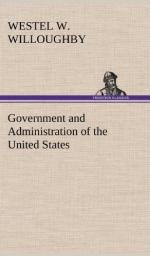Congress meets every year in the beginning of December. Each Congress lasts two years and holds two sessions—a long and a short session. The long session lasts from December to midsummer. The short session lasts from December, when Congress meets again, until the 4th of March. The term of office then expires for all the members of the House, and for one-third of the Senators. The long session ends in even years (1880 and 1882, etc.), and the short session in odd years (1881 and 1883). Extra sessions may be called by the President for urgent business.
In the early part of the November preceding the end of the short session of Congress, occurs the election of Representatives. Congressmen then elected do not take their seats until thirteen months later, that is, at the reassembling of Congress in December of the year following, unless an extra session is called. The Senate frequently holds secret, or, as they are called, executive sessions, for the consideration of treaties and nominations of the President, in which the House of Representatives has no voice. It is then said to sit with closed doors.
An immense amount of business must necessarily be transacted by a Congress that legislates for nearly sixty-three millions of people, inhabiting a territory of over three and a half millions of square miles.
Lack of time, of course, prevents a consideration of each bill separately by the whole legislature. To provide a means by which each subject may receive investigation and consideration, a plan is used by which the members of both branches of Congress are divided into committees. Each committee busies itself with a certain class of business, and bills when introduced are referred to this or that committee for consideration, according to the subjects to which the bills relate. Thus, for example, affairs relating to Washington are handed over to what is known as the District Committee, a regular appropriation bill to the Committee on Appropriations, etc. These committees consider these bills carefully, frequently taking the testimony of outside persons to discover the advisability of each bill. The regular course through which a bill has to go before becoming an act—i.e., to pass both houses and receive the signature of the President—is as follows: On Mondays there is a roll-call of the States, and members may then introduce in the House or Senate any bill they may desire. These bills are then referred by the presiding officer to appropriate committees. These committees, meeting in their own separate rooms, debate, investigate, and, if necessary, as has been said, ask the opinion of outside persons. After such consideration bills are reported back to the House or Senate. But very few bills reach this stage, for the committee does not get time to report any save the more important ones, and thus the majority of them disappear, or, as the saying is, “are killed in committee.”




